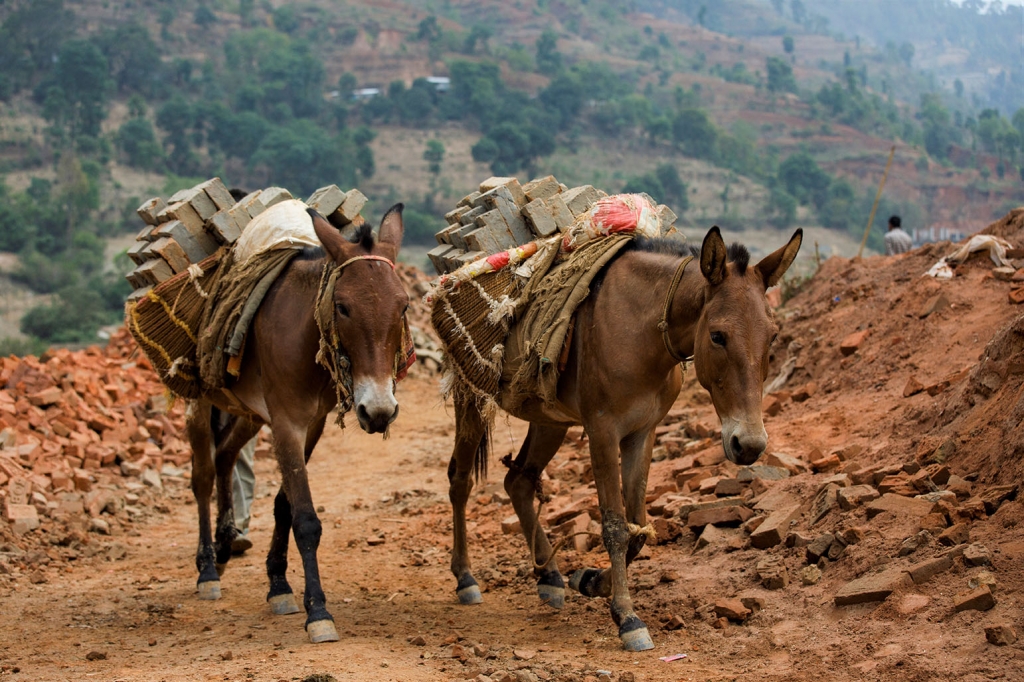
Equid Welfare In Nepalese Brick Kilns Highlighted By New Research Paper
A research article by the world’s largest equine welfare charity, The Donkey Sanctuary, focusing on the welfare of working equids in the brick kilns of Nepal, has been published and made available through free open access, by peer-reviewed scientific journal: Animals.
The aim of the research paper, entitled ‘A New Framework for Assessing Equid Welfare: A Case Study of Working Equids in Nepalese Brick Kilns’, is to understand the conditions that donkeys, mules, and horses are exposed to whilst working in Nepalese brick kilns, to better understand ways of improving their welfare.
The recent study is part of the Nepal Brick Kilns Project, and uses information from the Equid Assessment, Research and Scoping (EARS) tool that was gathered during 2018 and 2019 by the charity’s partner; Animal Nepal.
The information collected provides a robust baseline on which to monitor the effectiveness and impact of education programs on equid welfare in the future. The study is particularly relevant as brick kilns are difficult environments in which to maintain a high level of equid welfare.
Information gathered using the EARS tool was summarized using the Welfare Aggregation and Guidance (WAG) tool to pinpoint areas of welfare concern, and to suggest possible mitigation strategies under a powerful equid welfare monitoring framework.
The study also discovered that the handler’s attitude towards their equid has an impact on its welfare conditions. Suggested training programs to address this can subsequently be implemented, specifically focusing on the impacts of using harmful practices such as hobbling, or tethering, which involves tying the legs of the equid to stakes in the ground, substantially restricting any movement.
Stuart Norris, Senior Statistician at The Donkey Sanctuary and author of the paper said: “The paper provides the most detailed account of equid welfare and a fantastic baseline dataset in which to build strategies for improving the welfare of equids working in the brick kilns of Nepal.
“The use of the EARS tool, incorporating both the WAG tool and further analysis to understand the handlers’ impact on the welfare of equids, provides a robust monitoring tool to measure any future interventions.”
Tamlin Watson, Senior Researcher Global at The Donkey Sanctuary, and contributor to the paper explained: “Nepalese brick kilns are extremely hostile environments for humans and their working equids. This study uses EARS welfare assessments alongside WAG scoring to highlight the issues most negatively influencing equid welfare. This approach guides resources most effectively to improve working equid welfare.”
Head of Global Research at The Donkey Sanctuary, Zoe Raw who also contributed to the paper said: “Working donkeys and mules are the backbone of rural economies across the world, providing people with a means to earn a living, transport goods, collect water or enable their children to access education.
“In Nepal, working donkeys and mules play a critical role; owners rely on their donkeys and mules to transport bricks within the brick kilns in order to earn a living and to feed their families. This piece of research provides robust, scientific evidence to demonstrate the value that working donkeys and mules provide to impoverished communities in Nepal, and demonstrates the critical role that good welfare plays in these micro-economies. Using scientifically validated tools and research methods allows scientists to accurately understand what poor welfare looks like, which in turn, can support the development of specific and appropriate interventions.”
Zoe concluded: “Working animals have a critical role to play in human livelihoods and in development, and we look forward to seeing wider adoption of robust research techniques to help working animals and people in a more meaningful and impactful way.”
To ensure the research work by The Donkey Sanctuary is available to everyone, the article is available free through open access. The article is available here
The Donkey Sanctuary is a global leader for equine welfare, research and veterinary care. The charity operates programmes worldwide for animals working in agriculture, industry and transportation.
More from The Donkey Sanctuary
- Researchers find microplastics in 100 per cent of donkey faecal samples tested
- Role reversal: Devon donkeys provide wellbeing for equine welfare officers
- Leeds man says time with donkeys helped transform his life
- New research: Belief in animals’ capacity for emotion linked to better health and welfare
- Extra measures in place to protect donkeys from searing heat

 5 years ago
5 years ago  1497 views
1497 views
